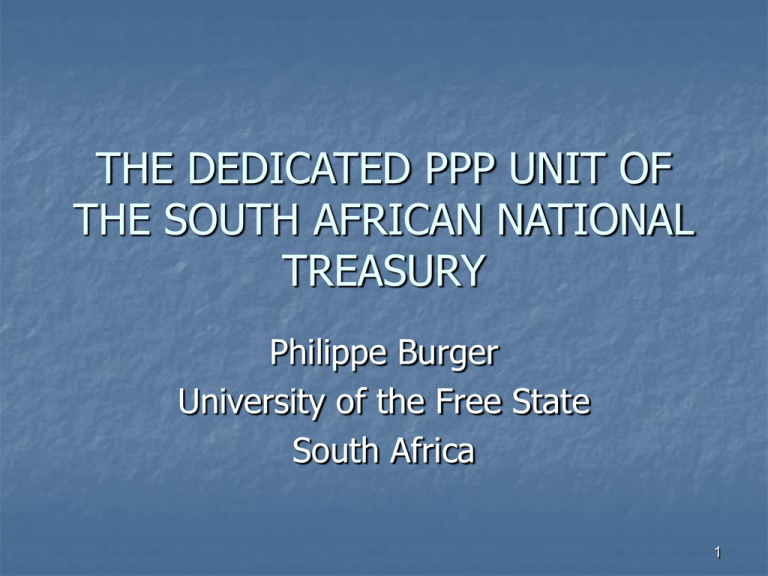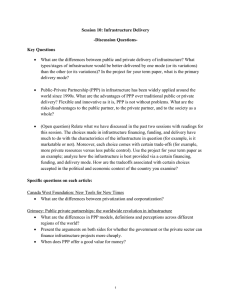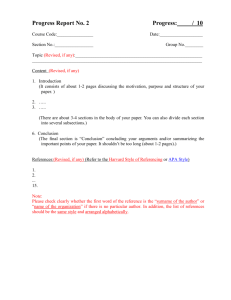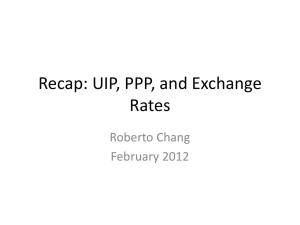THE DEDICATED PPP UNIT OF THE SOUTH AFRICAN NATIONAL TREASURY Philippe Burger
advertisement

THE DEDICATED PPP UNIT OF THE SOUTH AFRICAN NATIONAL TREASURY Philippe Burger University of the Free State South Africa 1 Overview The rationale for a dedicated PPP unit A brief history of PPPs and the PPP unit in South Africa The role of the South African dedicated PPP unit Future challenges Conclusion 2 The rationale for a dedicated PPP unit Fallacy regarding cost and the off-budget nature of PPPs Principle-agent and free-rider problem within government Department vs. government as a whole Centre of knowledge and expertise 3 A brief history of PPPs and the PPP unit in South Africa Apr 1997: Cabinet approved appointment of interdepartmental task team From 1997 to 2000: Six pilot project Framework for PPPs endorsed in Dec 1999 Nat Treasury issued PPP regulations Apr 2000. Mid 2000: PPP unit established in Nat Treasury. 4 Legislative framework: National and provincial PPPs: Treasury Regulation 16, issued 2004 to PFMA (1999). National Treasury PPP Practice Notes that constitute the PPP manual of the PPP unit Municipal PPPs: Municipal Public-Private Partnership Regulations, issued 2005 to Municipal Finance Management Act (2003) 5 Since 1997 average of 2 PPPs per annum Mar 2000 and Sept 2006: 13 projects signed Relatively slow roll out due to lack of skilled staff capacity in individual departments and provinces 45 projects in the pipeline in Dec 2002 7 signed 12 still in pipeline 26 deregistered 6 The role of the South African dedicated PPP unit Main functions: Ensure affordability, value for money and sufficient risk transfer In line with international best practice: Main drivers of value for money: risk transfer and competition Prerequisite for value for money is affordability 7 PPP unit in Nat Treasury has two broad tasks: Provide technical assistance to government departments, provinces and municipalities Provide Treasury Approvals during precontract phases The life cycle comprises six phases: 1) Inception; 2) Feasibility study; 3) Procurement; 4) Development 5) Delivery and 6) Exit 8 1. Inception phase Departments inform PPP unit of intent to set up PPP Also need to inform PPP unit of available expertise (concern to PPP unit) Appoint project officer and team Checklist 9 2. Feasibility study Feasibility study must pass three regulatory tests: affordability, value for money and risk transfer. Needs analysis Method of delivery Due diligence 10 Value assessment Base and risk-adjusted PSC & PPP reference model Discount rate Nominal values Analyse budget: affordability, value for money Economic valuation: greenfield or capital projects, or projects with externalities Procurement plan Treasury Approval:I 11 3. Procurement phase Documentation (draft contract) Treasury Approval:II: Procurement: Bidding process Department: demonstrate why preferred bidder fulfils criteria of affordability, value for money and risk transfer 12 Competition in bidding key element in this phase Ensures value for money If only one bidder: Competes with PSC Treasury Approval:IIB 13 Finalise contract, draw up management plan and complete due diligence on all parties Contract meets criteria of affordability, value for money and substantial risk transfer Capacity, mechanisms and procedures of department Treasury Approval:III 14 Management of agreement, once signed, rests with individual department or province Not the responsibility of PPP unit PPP unit still provides technical assistance 13 projects concluded, the length of the pre-contract period is roughly 8-18 months Environmental approvals 15 Future challenges Pace at which contracts are concluded Capacity constraints Contract managers Health, education and infrastructure development Initiative to setup such projects Ad hoc manner 16 1. 2. 3. Approach issue in structured and systematic manner Ascertain and prioritise the needs Analyse what is best method for service delivery in terms of value for money Portfolio of PPP projects structured in terms of policy priorities 17 Provincial dedicated PPP units Independently from national PPP unit Provincial officials trained Units rolled out as capacity develops Not all units rolled out simultaneously; some provinces might not have a units Provincial units mainly provide Treasury Approvals; National unit provides technical assistance 18 Long-term contracts and competition Competition disappears once contract is signed Markets might also become uncontested (no threat of new entrants) Pressure to renegotiate 19 Conclusion Role of dedicated PPP unit: Approve PPP agreements and Render technical assistance in creation and maintenance of PPPs. Initiative, ultimate management of and accountability regarding PPP agreements originates and rests with individual government departments and provinces 20



